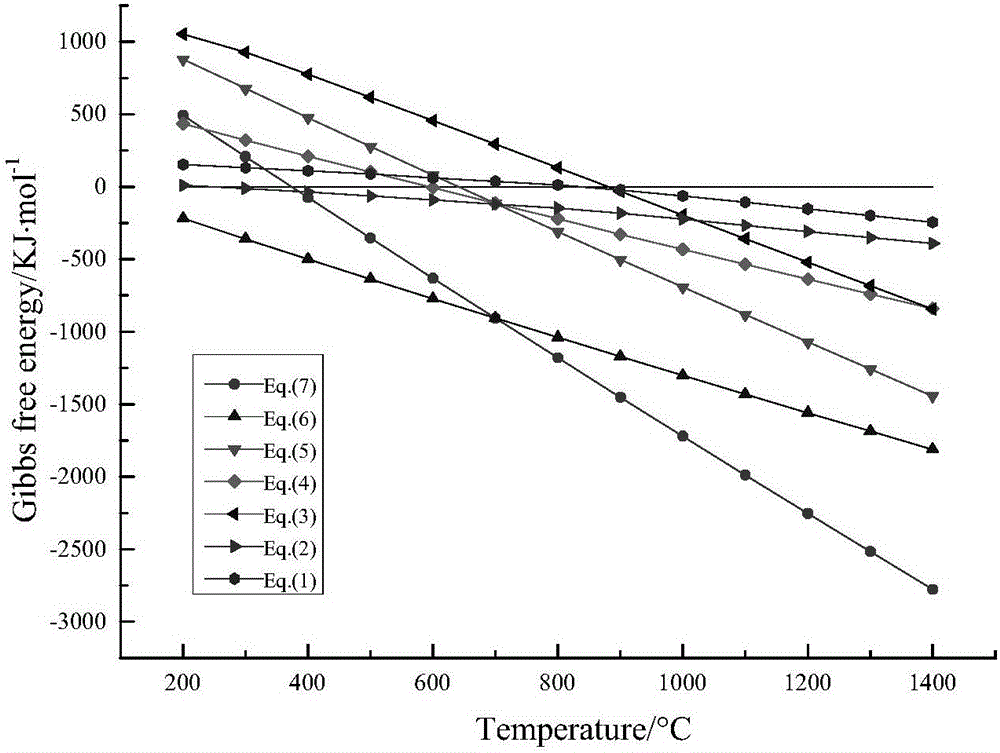Method for preparing arsenic by direct reduction and roasting of arsenic-containing material
A material and roasting technology, which is applied in the field of preparing arsenic and arsenic-containing materials directly through reduction roasting, can solve the problems of difficult handling of arsenate materials, and achieve landfill and storage disposal, volume reduction, The effect of mild process conditions
- Summary
- Abstract
- Description
- Claims
- Application Information
AI Technical Summary
Problems solved by technology
Method used
Image
Examples
Embodiment 1
[0033] Using calcium arsenate obtained from a copper soot alkali leaching-lime precipitation in Yunnan as raw material, take 100Kg of raw material and mix it evenly with carbon powder, put it into a vacuum electric arc furnace (the amount of carbon powder added is 15% of the mass of raw material), turn on the vacuum pump, when the pressure Start to heat up at 1000Pa, raise the temperature to 700°C and keep the reducing environment for 3 hours, then stop heating to condense the arsenic vapor. After the reduction is completed, when the temperature drops to room temperature, close the vacuum furnace, and obtain metal arsenic from the condensation pipe section, and the purity is >95 %, the main component of the reduced slag sample is CaO.
Embodiment 2
[0035] Sodium arsenate crystals obtained by high-pressure alkali leaching-cooling crystallization of a tin electrolytic anode slime in Yunnan are used as raw materials. The crystals contain 30.13% As, 0.58% Pb, 0.42% Sb and 0.07% Sn. Take 100Kg of the sodium arsenate crystal and carbon powder and mix it evenly and put it into a vacuum electric arc furnace (the amount of carbon powder added is 20% of the mass of the raw material), turn on the vacuum pump, start to heat up when the pressure is 1Pa, and raise the temperature to 700 ° C and maintain a reducing environment for 4 After 1 hour, stop heating to condense the arsenic vapor. After the reduction, when the temperature drops to room temperature, close the vacuum furnace, and obtain metal arsenic from the condensation pipe section. The purity is >94% after testing, and the main component of the reduction slag sample is Na 2 CO 3 .
Embodiment 3
[0037] With the ferric arsenate obtained by high-pressure alkali leaching-iron salt precipitation of a certain copper electrolytic anode slime in Yunnan as raw material, 100Kg of raw material and carbon powder are mixed evenly and then put into a reduction electric furnace (the carbon powder addition is 20% of the raw material quality), and the temperature is raised to 900°C and maintain the reducing environment for 2 hours, then stop heating to condense the arsenic vapor. After the reduction, when the temperature drops to room temperature, close the reduction furnace, and obtain metal arsenic from the condensation pipe section. The purity is >96% after testing, and the main components of the reduced slag sample It is an oxide of Fe.
PUM
 Login to View More
Login to View More Abstract
Description
Claims
Application Information
 Login to View More
Login to View More - R&D
- Intellectual Property
- Life Sciences
- Materials
- Tech Scout
- Unparalleled Data Quality
- Higher Quality Content
- 60% Fewer Hallucinations
Browse by: Latest US Patents, China's latest patents, Technical Efficacy Thesaurus, Application Domain, Technology Topic, Popular Technical Reports.
© 2025 PatSnap. All rights reserved.Legal|Privacy policy|Modern Slavery Act Transparency Statement|Sitemap|About US| Contact US: help@patsnap.com

